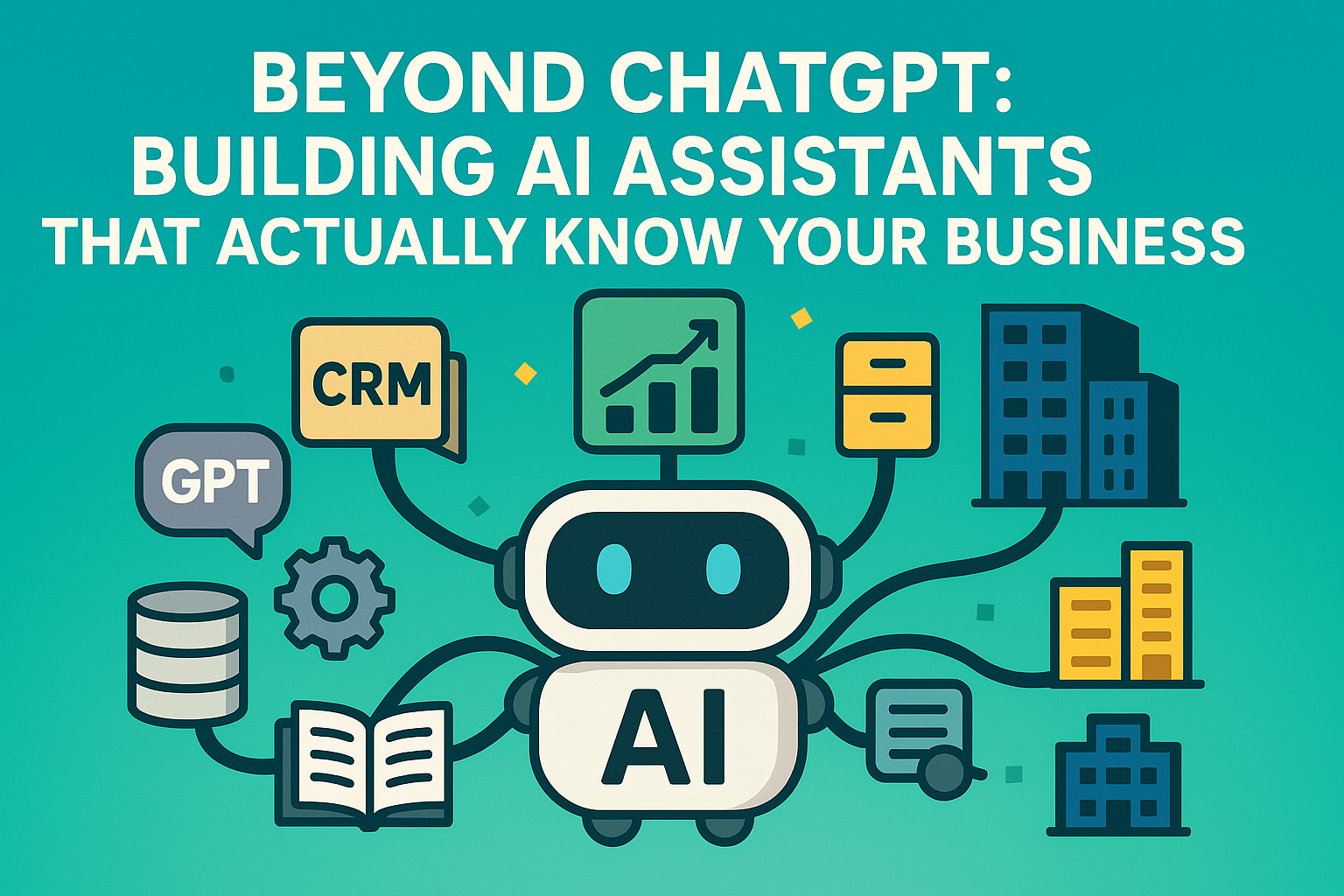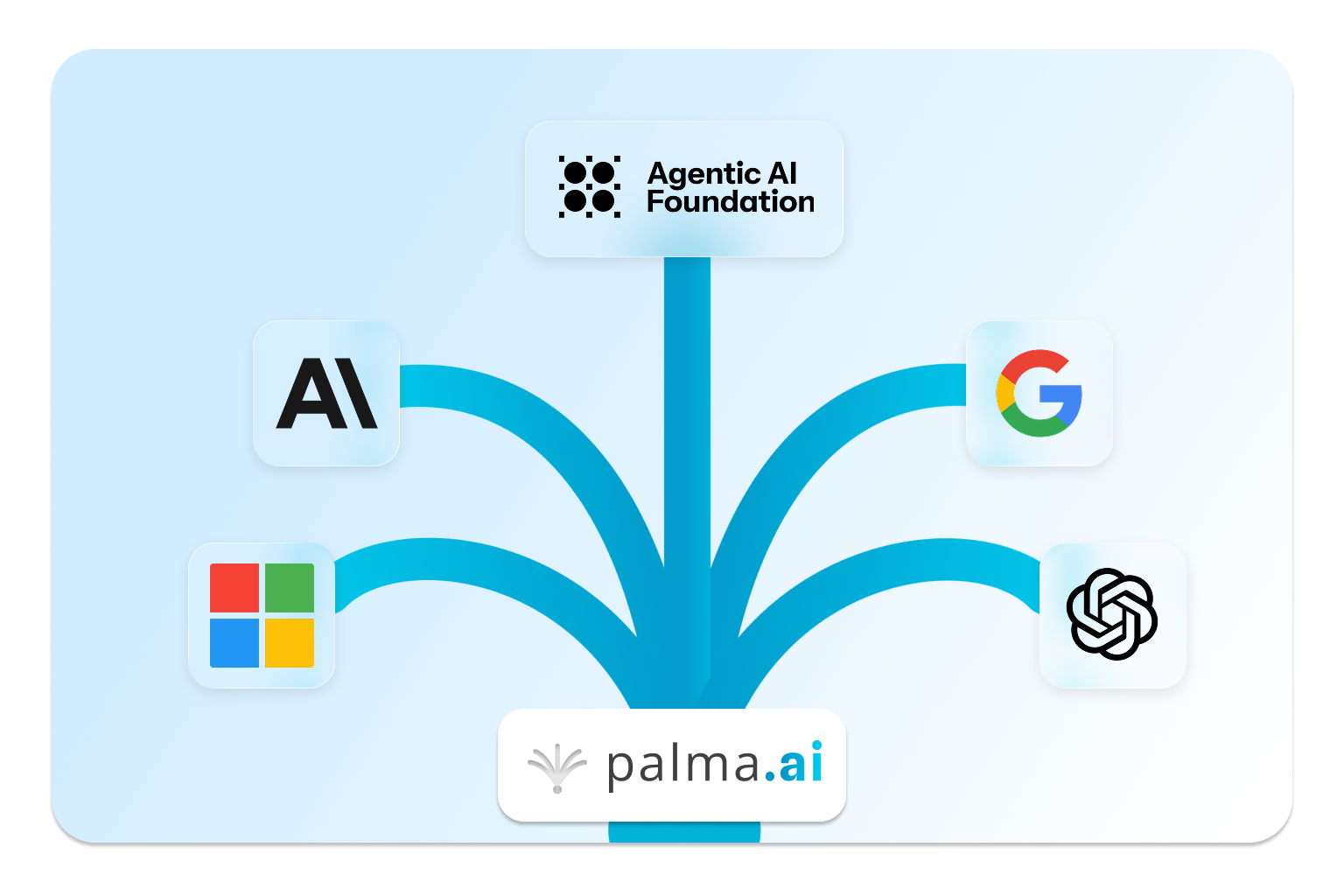Beyond ChatGPT: Building AI Assistants That Actually Know Your Business
Discover why generic AI tools aren't enough for enterprise success and how business-aware AI assistants transform productivity.

While ChatGPT and similar general-purpose AI tools have captured headlines and imagination, enterprise leaders are discovering a fundamental limitation: these tools know everything about the world, but nothing about your business. The gap between generic AI capabilities and actual business utility has never been more apparent, leaving organizations struggling to translate AI hype into meaningful productivity gains.
The solution lies not in more powerful language models, but in creating AI assistants that understand your specific business context, data, and workflows. This shift from generic to contextual AI represents the next evolution in enterprise artificial intelligence—one that transforms AI from an interesting experiment into an indispensable business tool.
The Generic AI Limitation
The Disconnect Problem
Generic AI tools operate in a vacuum, disconnected from the rich ecosystem of enterprise data that drives business decisions. When an employee asks ChatGPT about quarterly sales performance, upcoming deadlines, or customer interaction history, the AI can only respond with generic advice or request manual data input.
This disconnect creates several critical limitations that prevent organizations from realizing AI's full potential. Users must constantly provide context, explain business-specific terminology, and manually gather information from various systems before AI can provide meaningful assistance. The cognitive overhead of bridging this knowledge gap often exceeds the value AI provides, leading to low adoption rates and disappointing ROI.
💼 Real-World Example
Consider a sales manager preparing for a crucial client meeting. Generic AI might provide excellent templates for presentation structures or negotiation tactics, but it cannot access the client's purchase history, recent support tickets, upcoming contract renewals, or current opportunities in the pipeline. The manager must manually compile this information from Salesforce, support systems, and email archives before AI can provide contextually relevant insights.
The Power of Business-Aware AI
Contextual Intelligence
Business-aware AI assistants operate differently. They understand your organization's unique context, access real-time enterprise data, and provide insights grounded in actual business reality rather than generic best practices.
When properly connected to enterprise systems, AI assistants can synthesize information across multiple data sources instantly. They understand your company's products, customers, processes, and terminology. They can correlate trends across departments, identify patterns in historical data, and provide recommendations based on actual business performance rather than theoretical scenarios.
🎯 The Transformation
The transformation becomes evident in everyday interactions. Instead of asking "How do I improve customer retention?" and receiving generic advice, employees can ask "Why did we lose three major accounts last quarter, and what patterns suggest similar risks with current customers?" The AI assistant analyzes actual customer data, support interactions, contract terms, and engagement metrics to provide specific, actionable insights.
Real-World Enterprise AI Scenarios
Sales Team Transformation
Traditional AI interaction:
"Can you help me prepare for my client meeting tomorrow?"
The AI provides generic meeting preparation advice, requiring the user to manually gather client information, recent interactions, and opportunity details from various systems.
Business-aware AI interaction:
"Can you help me prepare for my meeting with Acme Corp tomorrow? I need their recent activity and current opportunities."
The AI responds: "I found your 2 PM meeting with Acme Corp. From Salesforce, they have 3 active opportunities worth $150K total. Their last email was about pricing on the Q2 proposal. I see they've had two support tickets this month regarding API integration. Would you like me to prepare talking points about their technical concerns and how our new features address them?"
Customer Support Excellence
Traditional AI limitation:
Support agents manually search through ticket systems, knowledge bases, and customer history while customers wait. Generic AI can provide standard troubleshooting steps but cannot access customer-specific context.
Business-aware AI capability:
"What's the status of ticket #1234 and has this customer had similar issues?"
The AI immediately responds: "Ticket #1234 is escalated to Level 2 support. This customer had 2 similar authentication issues in the past 6 months, both resolved by updating their API keys. Their contract includes priority support, and they're currently evaluating renewal. I've prepared a solution based on their previous successful resolutions."
Finance Team Analytics
Generic AI provides theoretical financial analysis frameworks but cannot access actual company data to generate specific insights.
Business-aware AI transforms financial analysis:
"I need to understand why our Q3 operating expenses increased 15% compared to last quarter."
The AI analyzes ERP data and responds: "The 15% increase stems from three primary areas: Marketing spend up 28% due to the product launch campaign ($45K), new engineering headcount additions (+$62K monthly), and office lease renewal with 12% increase. The marketing spend shows strong ROI with 35% lead increase. Would you like me to project Q4 expenses based on current hiring plans?"
Operations Optimization
Traditional AI cannot access real-time operational data, limiting its ability to provide actionable insights for supply chain, inventory, or resource management decisions.
Business-aware AI enables proactive operations management:
"Our Denver warehouse is showing inventory shortages. What's causing this and how do we fix it?"
The AI analyzes inventory systems, supplier data, and demand forecasts: "Denver warehouse has 23 SKUs below reorder points. Root causes include supplier delays (average 8 days late this month), higher Southwest region demand (+22%), and quality holds on Product Line C. I can expedite orders from Phoenix backup suppliers and trigger emergency transfers from Chicago facility."
The Technical Foundation
Creating business-aware AI requires more than connecting APIs to language models. It demands a sophisticated integration layer that understands enterprise data structures, maintains security protocols, and provides contextual intelligence while preserving data governance.
Model Context Protocol (MCP): The Standard Solution
The Model Context Protocol (MCP) emerges as the standard for creating these connections. MCP provides a structured framework for AI systems to access enterprise data sources while maintaining security, audit trails, and role-based permissions.
Standardized connectors that plug into existing enterprise systems
Handles authentication, data formatting, and security concerns
Enables multiple AI tools without rebuilding integrations
This standardization enables organizations to connect multiple AI tools to their enterprise data ecosystem without rebuilding integrations for each new AI capability. The protocol handles authentication, data formatting, and security concerns while providing AI systems with rich business context.
Implementation Challenges and Solutions
Data Silos and Integration Complexity
Most enterprises store critical business information across dozens of systems: CRM platforms, ERP systems, communication tools, project management platforms, and industry-specific applications. Traditional AI implementations require custom integrations for each system, creating technical debt and maintenance overhead.
MCP Solution: Standardized connectors that integrate once and work with multiple AI systems. Organizations can connect their entire technology stack to AI assistants without custom development or ongoing integration maintenance.
Security and Compliance Concerns
Connecting AI systems to enterprise data raises legitimate security and compliance concerns. Organizations need granular control over data access, complete audit trails, and the ability to revoke permissions instantly.
Enterprise Solution: Role-based access control (RBAC) ensures AI assistants can only access data appropriate for each user's role. Complete audit trails track every AI interaction with enterprise systems, supporting compliance requirements and security monitoring.
User Adoption and Change Management
Even the most sophisticated AI assistants fail without user adoption. Organizations must consider training requirements, workflow integration, and change management strategies.
Natural Adoption: Business-aware AI assistants naturally drive adoption by providing immediate value through contextual insights. Users don't need to learn new interfaces or change existing workflows—AI assistants integrate into existing communication patterns and business processes.
Measuring Business Impact
The transformation from generic to business-aware AI creates measurable business value across multiple dimensions:
Time Savings
Employees spend less time gathering information and more time acting on insights. Organizations report 30-50% reduction in time spent on information gathering and analysis tasks.
Decision Quality
AI assistants with access to comprehensive business data enable better-informed decisions. The ability to correlate data across systems reveals insights that would otherwise remain hidden.
Process Acceleration
Business processes move faster when AI can access required information instantly. Customer inquiries resolve more quickly, sales cycles accelerate, and operational decisions happen in real-time.
Knowledge Retention
Business-aware AI systems capture and codify institutional knowledge, making it accessible across the organization even as employees change roles or leave the company.
The Strategic Imperative
🚀 Competitive Advantage
The competitive advantage belongs to organizations that move beyond generic AI to create truly intelligent business assistants. As AI capabilities continue advancing, the differentiator will not be access to powerful language models—it will be the ability to connect those models to unique business contexts and data.
Organizations that invest in business-aware AI infrastructure today position themselves to leverage future AI advances more effectively than competitors relying on disconnected, generic tools. Every new AI capability can immediately access the full context of their business operations, multiplying the value of each technological advancement.
Why Palma.ai is the Enterprise Solution
While the vision of business-aware AI is compelling, the execution requires sophisticated enterprise infrastructure that most organizations cannot build internally. Palma.ai provides the comprehensive MCP gateway platform that transforms this vision into reality.
Centralized MCP Management
Palma.ai's platform serves as the single integration point between your enterprise systems and AI assistants. Instead of managing dozens of custom API integrations, organizations connect once through Palma.ai's gateway and gain access to their entire technology ecosystem. This centralized approach eliminates integration complexity while providing enterprise-grade security and governance.
Role-Based Intelligence
Every user gets AI assistants tailored to their specific role and data access permissions. Sales teams access Salesforce and customer communication tools, while finance teams connect to ERP systems and financial databases. Palma.ai's multi-tenant architecture ensures each AI assistant understands the user's business context without compromising data security.
Enterprise Security and Compliance
Palma.ai's zero trust architecture provides the security controls enterprises demand. Complete audit trails track every AI interaction with business systems, role-based access control ensures appropriate data access, and enterprise-grade encryption protects sensitive information. Organizations maintain full control over their data while enabling powerful AI capabilities.
Plug-and-Play Integration
Rather than developing custom integrations for each enterprise system, Palma.ai leverages existing, vetted MCP servers that connect seamlessly to popular business applications like Salesforce, Microsoft 365, Jira, SAP, and hundreds of other enterprise tools. New integrations deploy in minutes rather than months.
Scalable Architecture
Palma.ai's platform supports thousands of users across different teams and departments, each with customized AI assistants that understand their specific business context. The platform scales from pilot deployments to enterprise-wide rollouts without compromising performance or security.
💡 The Clear Choice
The choice facing enterprises is clear: continue struggling with generic AI tools that require constant manual context, or deploy business-aware AI assistants that understand your unique operations from day one. Palma.ai provides the infrastructure to make that transformation immediate and seamless, turning AI from an interesting experiment into your organization's most valuable business intelligence platform.
Read More

Palma.ai Joins OpenAI, Anthropic & Microsoft as AAIF Member
Palma.ai is proud to join the Agentic Artificial Intelligence Foundation (AAIF) as a Silver-tier member alongside founding members Anthropic, OpenAI, Google, AWS, and Microsoft to shape the future of AI agent standards.

Why Google's Agent-to-Agent Gift Feels Like Kubernetes All Over Again
Google's donation of the A2A protocol to the Linux Foundation mirrors what happened in 2015 with kubernetes. Patrick Gruhn was part of that wave with his previous company (exit to cisco), Replex.io, and now part of the next wave with palma.ai. This analysis explores how standardized AI protocol, will reshape enterprise AI infrastructure—and why having the right management layer matters now.
Ready to Future-proof your AI Strategy?
Transform your business with secure, controlled AI integration
Connect your enterprise systems to AI assistants while maintaining complete control over data access and user permissions.